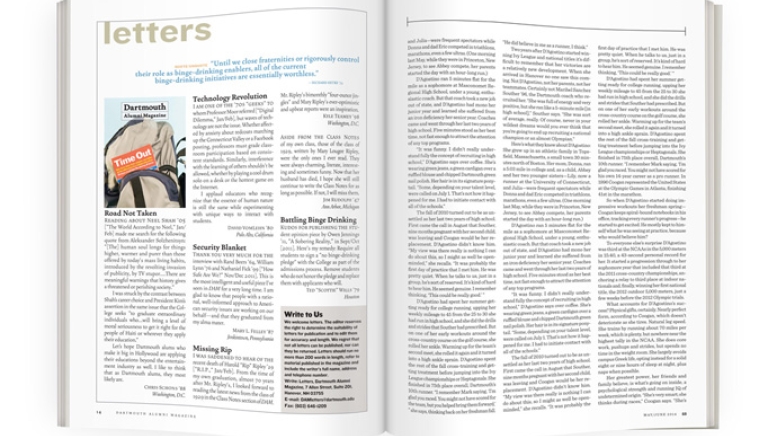Road Not Taken Reading about Neel Shah ’05 [“The World According to Neel,” Jan/Feb] made me search for the following quote from Aleksander Solzhenitsyn: “[The] human soul longs for things higher, warmer and purer than those offered by today’s mass living habits, introduced by the revolting invasion of publicity, by TV stupor….There are meaningful warnings that history gives a threatened or perishing society.” I was struck by the contrast between Shah’s career choice and President Kim’s assertion in the same issue that the College seeks “to graduate extraordinary individuals who…will bring a level of moral seriousness to get it right for the people of Haiti or wherever they apply their education.” Let’s hope Dartmouth alums who make it big in Hollywood are applying their educations beyond the entertainment industry as well. I like to think that as Dartmouth alums, they most likely are.
Chris Schons ’88 Washington, D.C.
Technology Revolution I am one of the ’70s “geeks” to whom Professor Moor referred [“Digital Dilemma,” Jan/Feb], but waves of technology are not the issue. Whether affected by anxiety about redcoats marching up the Connecticut Valley or a Facebook posting, professors must grade classroom participation based on consistent standards. Similarly, interference with the learning of others shouldn’t be allowed, whether by playing a cool drum solo on a desk or the hottest game on the Internet. I applaud educators who recognize that the essence of human nature is still the same while experimenting with unique ways to interact with students.
David VomLehn ’80 Palo Alto, California
Security Blanket Thank you very much for the interview with Rand Beers ’64, William Lynn ’76 and Nathaniel Fick ’99 [“How Safe Are We?” Nov/Dec 2011]. This is the most intelligent and useful piece I’ve seen in DAM for a very long time. I am glad to know that people with a rational, well-informed approach to American security issues are working on our behalf—and that they graduated from my alma mater.
Mary L. Felley ’87 Jenkintown, Pennsylvania
Missing Rip I was saddened to hear of the recent death of Harold “Rip” Ripley ’29 [“R.I.P.,” Jan/Feb]. From the time of my own graduation, almost 70 years after Mr. Ripley’s, I looked forward to reading the latest news from the class of 1929 in the Class Notes section of DAM. Mr. Ripley’s bimonthly “four-ounce jingles” and Mary Ripley’s ever-optimistic and upbeat reports were an inspiration.
Kyle Teamey ’98 Washington, D.C.
Aside from the Class Notes of my own class, those of the class of 1929, written by Mary Lougee Ripley, were the only ones I ever read. They were always charming, literate, interesting and sometimes funny. Now that her husband has died, I hope she will still continue to write the Class Notes for as long as possible. If not, I will miss them.
Jim Rudolph ’47 Ann Arbor, Michigan
The Battle Against Binge Drinking Kudos for publishing the student opinion piece by Owen Jennings ’11, “A Sobering Reality,” in Sept/Oct [2011]. Here’s my remedy: Require all students to sign a “no binge-drinking pledge” with the College as part of the admissions process. Remove students who do not honor the pledge and replace them with applicants who will.
Ted “Scottie” Wills ’79 Houston
I embrace the thesis put forth by Jennings that Dartmouth students are the only people with real power to control binge drinking, but I challenge most of his other observations. Jennings wants an infrastructure that “lets students get drunk” but “in a safe way.” The words “drunk” and “safe” don’t belong in the same sentence. Drunkenness causes serious short- and long-term physical and mental harm and all too often leads to sexual assault, vandalism, fighting and vehicular homicide. Jennings would also have us believe that punishment will have little effect. He is wrong: If binge drinkers are suspended or expelled from the College, at least after repeated offenses, fewer cases of binge drinking will occur. Current rules are a paper tiger. Jennings further argues that we can’t prevent students from binge drinking so trying is wasted effort. Just as tighter gun-control laws reduce homicides, tighter control of alcohol distribution will reduce binge-drinking problems. Where there’s a will, there’s a way. Dartmouth’s current control of alcohol distribution is a joke. Jennings also observes that school administrators (and presumably alumni groups as well) cannot solve the problem. Jennings is literally correct but ignores missed opportunities. We have a president who has publicly and privately expressed his support of fraternities. We have a fraternity- dominated board of trustees that has done very little of substance to address binge drinking. We have an Alumni Council that has created a committee to support Greek life but has taken no measurable steps to control binge drinking in fraternities, where most of it is encouraged and hosted. Until we close fraternities or rigorously control their role as binge-drinking enablers, all of the current binge-drinking initiatives are essentially worthless. Post-Greek Amherst and Williams are thriving, with alumni bodies every bit as loyal and devoted as Dartmouth’s. If Dartmouth alumni will disown their alma mater for closing fraternities, as Jennings suggests, let them walk.
Richard Hetke ’73 Hinsdale, Illinois
Queer Theory America is not queer [“Ameri-ca is Queer,” Sept/Oct 2011]. Michael Bronski calling America “queer” and “evil” does not make it so. What rubbish to say that “to become American…is to be a little queer.” That’s just another attempt at self-justification from the world of gender studies.
Doug Kingsley ’84, Th’85 Sherborn, Massachusetts
Reminder of Recent History My classmate Joe McHugh ’60 [“Letters,” Sept/Oct 2011] traces the partisan divide in Washington, D.C., back only as far as the 2000 election, which he said left Democrats “bitterly antagonistic” toward George W. Bush. Well, yes, I and many others were angry at how Florida election officials and the U.S. Supreme Court stole that election, but as to the origin of bitter partisanship, let’s look back to Bill Clinton’s election in 1992, which launched an unrelenting GOP campaign of investigations and other harassments in an effort to bring him down. The same tactics continue today as the GOP works not to build a better America, but to “make Obama a one-term president.”
Alexander Ingham ’60 Morganville, New Jersey
Too Much Enforcement? The account of the Ham Lake fire and subsequent suicide of Steve Posniak ’66 as told by Jane Varner Malhotra ’90 [“Burned,” Nov/Dec 2011] was very compelling. It could easily have warranted the title “Hounded to Death”—a not unusual phenomenon around here in my (62-year) experience. Great work. Thanks.
Tom Cox Duluth, Minnesota




